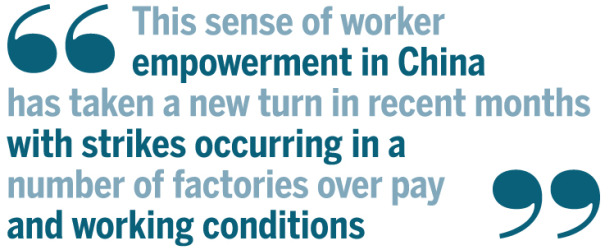Made in China: Tech, Ethics and Economics
September 1, 2010 | 07:28

Labour laws and worker empowerment
Another reason manufacturers need to move their factories is that Chinese workers are increasingly reluctant to move to coastal factories far from home for low wages and poor conditions. They are better informed than at any point in the last 30 years and know more about employment options and employee rights.China’s Labour Contract Law, which came into force in 2008, was largely intended to protect the rights of low-end workers, many of whom had either gone without contracts or were tied to insufficient agreements. No longer could employers neglect to make social security contributions, shirk health and safety requirements, exploit workers through unfair probationary periods and overtime conditions, or keep long-serving employees off contracts and then dismiss them without due cause.
“If you are paying a good wage you wouldn’t have a [labour] shortage,” said Jeremy Sargent, Guangzhou-based managing director of JSA, a legal practice that does a lot of work in the Pearl River Delta. “The Labour Contract Law gives employees a lot more grounds to bring an action against employers. There is a much greater sense of awareness among workers of what their rights are. And if they are going to enforce these rights they have a good chance of winning.”
Sargent points to reports stating that 90 per cent of arbitration cases brought on grounds of unfair termination of contract are won by the employees. Chinese lawyers have even been known to set up desks outside factories in order to sign up clients.

This sense of worker empowerment has taken a new turn in recent months with strikes occurring in a number of factories over pay and working conditions. Honda saw its China operations grind to a halt in late May as 1,900 workers at a parts factory in Foshan, Guangdong province ran for over two weeks. The employees eventually secured a 24 per cent wage hike. As a result, industrial action was launched at two more Honda parts plants in Guangdong and even at the firm’s joint venture car manufacturing plant.
The trouble didn’t stop there. Workers at a string of predominantly foreign-owned factories downed tools in June over wage demands. Strikes are not new to China – the Pearl River Delta alone sees thousands of labour disputes each year – but they have usually been highly localized and focused on unpaid wages or poor workplace conditions. Industrial action specifically concerning salary levels has, until now, been relatively rare. Honda isn’t known for employee abuses; however, it is seen as a company that can afford to spend a little more on its workforce.
It’s worth noting that the workers have demographics on their side, too. The percentage of the population aged 65 or over is expected to hit 16 per cent by 2020, compared to the present figure of 10 per cent. Meanwhile the labour supply aged 40 and below is dwindling. In economic terms, China may be approaching a “Lewisian turning point,” where the supply of subsistence level workers falls away, prompting a sharp rise in industrial wages.
Although it's not in the government’s interests to see widespread labour unrest, a change in attitudes towards Chinese manufacturing is on the policy agenda. First of all, Beijing is keen to climb the product value chain – it wants to develop the technological skills that mean China contributes more than 6.2 per cent of the retail price of an iPod. T-shirt and trainer manufacturers are welcome to decamp to Vietnam provided they are replaced by higher value operations. Indeed, in 2007 China reduced or removed VAT rebates on a range of exports identified as low end or high energy-consuming. Many of the rebates were reinstated in response to the global economic downturn but in recent months a few product categories have seen new cuts.
Encouraging employers to invest in their workforces through better training and higher salaries with a view to long-term retention is part of this process. China wants to be a center for product innovation – and collect the higher revenues that come with it – rather than continue in its current role as the default location solely for final product assembly.
Secondly, Beijing recognizes that it has a lot to do in terms of wealth distribution within China. While the post-1979 economic reforms led to explosive growth in external trade, incomes haven’t kept pace: wages accounted for 11 per cent of total economic output in 2008 compared to 17 per cent in 1980, while income as a percentage of GDP is as low as 30 per cent in the hinterlands compared to 60 per cent in most developed countries.
This is especially important given the government’s objective to recalibrate China’s economic growth model so it relies more on domestic consumption as opposed to capital investment and exports. Seven Chinese provinces raised minimum wages in the first quarter of 2010.
In this respect, rising salaries may actually be of long-term benefit to the likes of Hon Hai as it opens up a new market within China itself for consumer electronics products. “We believe a rising labour wage trend could be the catalyst that leads to a higher PC penetration rate in China and [so] strengthens Hon Hai’s growth outlook,” Deutsche Bank’s Kao said in a recent report.

MSI MPG Velox 100R Chassis Review
October 14 2021 | 15:04








Want to comment? Please log in.